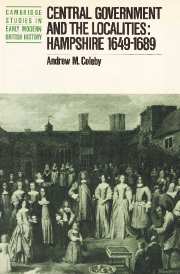Book contents
- Frontmatter
- Contents
- List of maps
- Acknowledgements
- List of abbreviations
- INTRODUCTION AND PROLOGUE
- PART I THE INTERREGNUM
- 1 LOCAL OFFICE-HOLDING 1649–60
- 2 THE ENFORCEMENT OF POLICY 1649–60
- 3 GOVERNMENT AND COUNTY 1649–60
- PART II THE RESTORATION
- PART III FROM THE POPISH PLOT TO THE REVOLUTION OF 1688
- EPILOGUE AND CONCLUSION
- Bibliography
- Index
1 - LOCAL OFFICE-HOLDING 1649–60
Published online by Cambridge University Press: 14 October 2009
- Frontmatter
- Contents
- List of maps
- Acknowledgements
- List of abbreviations
- INTRODUCTION AND PROLOGUE
- PART I THE INTERREGNUM
- 1 LOCAL OFFICE-HOLDING 1649–60
- 2 THE ENFORCEMENT OF POLICY 1649–60
- 3 GOVERNMENT AND COUNTY 1649–60
- PART II THE RESTORATION
- PART III FROM THE POPISH PLOT TO THE REVOLUTION OF 1688
- EPILOGUE AND CONCLUSION
- Bibliography
- Index
Summary
Local office-holding was clearly vital to the relationship between central government and the localities. Nomination to office at county level lay with central government, but it was up to those named to decide whether to serve the state in the office to which they had been appointed. The Civil Wars, Pride's Purge and the establishment of the republic rendered the situation one of unprecedented complexity, with ambivalent and ambiguous motivations existing side by side within both Whitehall and local society. Yet the evidence of appointments in local government has been used to assess the commitment of members of central government in this period to the conciliation of their erstwhile opponents and the creation of a lasting political settlement; and a willingness on the part of these opponents to serve at the local level has been seen as signifying a wider acceptance of the permanence of Interregnum regimes. Conversely, the new resources of the state, notably in the military and revenue establishments brought into existence by the Civil Wars, may be seen as providing central government with unpopular but effective levers in local administration, overcoming entrenched elites and interests.
Paradoxically, Hampshire seems to conform neither to the conciliation nor the centralization model. As will be demonstrated below, the impact of Interregnum governments upon office-holding in the county was far from clear-cut.
- Type
- Chapter
- Information
- Central Government and the LocalitiesHampshire 1649-1689, pp. 17 - 31Publisher: Cambridge University PressPrint publication year: 1987



